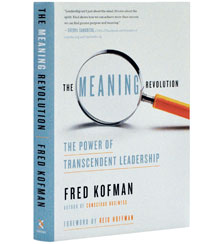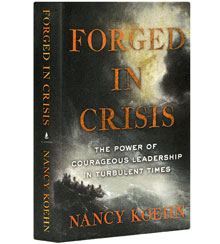Best Business Books 2018: Leadership
Engagement Announcements. See also Top Shelf Picks: Best Business Books 2018.
Fred Kofman
The Meaning Revolution: The Power of Transcendent Leadership (Currency, 2018)
*A TOP SHELF PICK
Nancy Koehn
Forged in Crisis: The Power of Courageous Leadership in Turbulent Times (Scribner, 2017)
Jeffrey A. Kottler
What You Don’t Know about Leadership but Probably Should: Applications to Daily Life (Oxford University Press, 2018)
The importance of finding meaning in the workplace is all the rage in the C-suite, at all-hands meetings, and in the leadership section of bookstores. This is not surprising, given the all-consuming nature of work today. Tethered to their offices and colleagues 24/7 by technology, more people are asking: Why am I doing this? When they lack a satisfactory answer, individuals are likely to feel overwhelmed and confused, which can lead them to disengage.
As a result, employee engagement has become the greatest talent challenge in organizations; Gallup found that just under 30 percent of U.S. workers feel engaged by their work. By contrast, 50 percent reported feeling disengaged. They have either checked out emotionally and show up just for the paycheck, or, worse, are actively hostile to their employers.
Each of this year’s best business books on leadership provides an illuminating lens on the subject of meaningfulness. Fred Kofman, an economist and consultant who is now a leadership development advisor at Google, addresses it head-on, delivering startlingly pointed insights. Nancy Koehn, a historian at the Harvard Business School, offers beautifully researched lessons on the motivating power of meaning by presenting five portraits of powerful historical leaders whose lives and work were suffused with a sense of purpose. And Jeffrey Kottler, clinical professor of psychiatry at the Baylor College of Medicine, delivers psychological insights that cut through the clutter of so much leadership-speak.
Transcendence
Fred Kofman starts The Meaning Revolution: The Power of Transcendent Leadership, the best of this year’s crop, with a bang by identifying four fundamental “hard problems” that chronically bedevil organizations. He then proceeds to demonstrate why only leaders who are able to transcend these problems by infusing a sense of meaning into the enterprise have any hope of succeeding over time.
Transcendence is required to address the hard problem of disengagement, which Kofman notes is usually the result of “the leader being a soulless jerk.” He defines a jerk as someone who imagines that people are motivated only by money and therefore don’t care about a sense of purpose and contribution. Pay them enough, the thinking goes, and they will show up and do the work.
But what’s the best and fairest way to pay them? That’s another hard problem, especially in complex organizations where talented people with specialized skills do much of their work in teams. Kofman notes that the exclusive focus on monetary rewards inevitably leaves organizations fighting a fierce but losing struggle to balance individual and team results. Rewarding high performers serves the imperatives of accountability and excellence but can undermine alignment and cooperation among team members. Yet basing pay on team results in order to incentivize collaboration often ends up inadvertently rewarding subpar individual performance and penalizing individual excellence. Neither approach helps the larger enterprise succeed.
HR departments and consultants expend great effort trying to address this reward paradox. But Kofman, a trained economist, believes the conflict cannot be solved with numeric formulas. It must instead be managed by leaders who engage “nonmaterial incentives” in the service of inspiration. These include getting recognition, being part of a larger community, having the chance to form deep relationships, gaining opportunities for learning, doing work that makes a positive difference in the world, and getting support in reaching one’s full potential. By infusing people’s lives with a sense of meaning, the transcendent leader is able to leverage what Kofman calls “moral and ethical goods” in order to balance performance and cohesion.
How can you become a transcendent leader? After thoroughly describing the hard problems, Kofman examines five soft solutions. He does so not by offering the generalized exhortations so common in leadership writing (Be inclusive! Be empathic! Walk the talk!) but by describing in rich detail the specific behaviors that inspire and engage others at their core.
Chief among these is what Kofman calls “response-ability,” the willingness to recognize that you consciously choose your responses, no matter the circumstances, rather than feeling victimized by events or seeking to place blame. He shows how you can shift self-perception from passive to active player by making highly specific changes in how you describe events. Being response-able is a necessary precondition to leading with integrity, which Kofman notes is both expressed by and perceived through how one approaches commitments. Here, Kofman offers advice on how to make a commitment, how to keep a commitment, how to ask for a commitment, how to renegotiate a commitment, how to apologize, and how to hold others to account.
In Kofman’s view, the first step to transcendence is transcending yourself: practicing humility and actively confronting your own mortality. Only by getting over yourself and realizing the extent to which the world will continue to spin without you can you lead an organization in which others will find purpose and meaning.
Only by getting over yourself and realizing the extent to which the world will continue to spin without you can you lead an organization in which others will find purpose and meaning.
It is not sufficient for a leader alone to demonstrate these behaviors, however. He or she must hold everyone who manages a division, unit, team, or function accountable as well. Kofman makes clear that one of the hard problems of leadership is that an organization is only as strong as its weakest leader. Even those inspired by an exceptional CEO or division head will grow cynical if their immediate boss fails to foster a sense that the work being done is meaningful and serves a larger purpose. When an appreciation for the key role of nonmaterial incentives does not cascade across levels, the enterprise will be reduced to fiddling with algorithms in hopes of finding a reward system that will stop the rot of disengagement.
Forged in Crisis
The transcendent leadership that Kofman advocates is exemplified in the five detailed historical case studies of leaders that make up Nancy Koehn’s excellent Forged in Crisis: The Power of Courageous Leadership in Turbulent Times. Like Kofman, Koehn makes clear that great leaders always act from a highly developed sense of purpose that others find inspiring. But she adds an important corrective to how a pure mission focus is often viewed by showing that some of the most effective and purpose-driven leaders the world has ever seen demonstrated surprising flexibility. They did so by remaining open to new information, constantly refining their understanding of facts on the ground, and shifting their notion of what was possible and what would constitute a successful outcome.
This flexibility is so profound that it can change the definition of the mission, leading to a highly intentional form of what might otherwise be viewed as mission creep. Consider Abraham Lincoln. During the lead-up to and early portion of the Civil War, he understood its purpose as simply the preservation of the Union as it had existed since the 1787 Constitutional Convention, even if that meant upholding slavery where it legally existed. By mid-1862, given the length and bloodiness of the engagement, along with early Southern success in battle, he became convinced that a negotiated return to the status quo ante had become impossible. For the Union to survive, it must strive to become “a more perfect Union,” guaranteeing the right to life, liberty, and the pursuit of happiness to all its citizens. This realization, combined with the pressing Northern need for more troops, which only the enlistment of freed African-American slaves could meet, persuaded Lincoln to issue the Emancipation Proclamation on January 1, 1863. His ceaseless efforts to “make sense of the war” and his capacity for patient reflection kept him open to reconsidering even the war’s ultimate purpose.
Koehn is especially strong in analyzing the role that serious setbacks and extreme discouragement play in the forging of courageous leaders. Her leaders, who include environmentalist Rachel Carson, abolitionist Frederick Douglass, and explorer Ernest Shackleton, experience periods of great loneliness and outright despair as the complexities of their respective undertakings threaten to overwhelm them. But even terrible grief serves to instill resilience and patience, while also teaching leaders to manage their emotions in times of great duress.
Forged in Crisis is at its most compelling when showing the complexity that ethics can take on in charged situations. Koehn offers a riveting study of Dietrich Bonhoeffer, the brilliant theologian and charismatic pastor who fiercely resisted Hitler’s rise and rule, and paid for it with his life.
Born into an illustrious family and superbly educated, Bonhoeffer spent his young adulthood as an academic star and pastor in the German Evangelical Church, the mainstream Lutheran denomination in his home country. During Hitler’s ascent in the 1920s, he taught and preached that the Nazi creed was incompatible with Christianity; when Hitler assumed power in 1933 and required leaders of the established church to swear loyalty to him, Bonhoeffer founded the Confessing Church as an alternative to what became known as the Reichskirche and worked with ecumenical leaders across Europe to oppose the Nazis.
Harassed and threatened, Bonhoeffer fled to New York in 1939, where he accepted a position at the Union Theological Seminary. Yet almost as soon as he’d settled in, Bonhoeffer made the startling decision to return to Germany to join the resistance. Once home, he not only continued to preach and write in defiance of the Nazis, but also actively worked with senior diplomats and military intelligence officials plotting to assassinate Hitler, undertaking missions on their behalf while serving as spiritual advisor to the conspirators.
Koehn’s examination of how Bonhoeffer reconciled active engagement in repeated murder attempts of those he judged purely evil with a lifelong commitment to Christian ethics as articulated in the Sermon on the Mount should be required reading for any leader negotiating challenging moral terrain. She notes that his unceasing examination of his own motives and actions, along with a willingness to admit rather than rationalize away the moral ambiguity of his choice, resulted in a profound self-awareness and a redoubling of his commitment to be “faithful to the things of daily life.”
What You Don’t Know
A less dramatic manifestation of this commitment forms the thread of Jeffrey Kottler’s thoughtful and engaging book, which focuses on how leadership manifests itself in everyday life. It’s a refreshingly down-to-earth approach that complements Kofman’s and Koehn’s work by keeping the conversation free of grandiose proclamations and putting the focus squarely on behavior, ethics, and self-awareness. Kottler also does a superb job of showing how effective leaders embed themselves within the larger culture and reflect the values of those in their care. But unlike the first two authors, he finds that those who lead by force of charisma, brilliance, and unquestioning self-confidence usually succeed despite, rather than because of, their personalities.
Just as Kofman does, Kottler takes as his starting point the pervasive problem of disengagement, which he says shows how out of touch most leaders are with the needs of those in their care. The advent of the virtual workplace has exacerbated this detachment, and Kottler argues that few leaders have been trained to assume their roles in a virtual universe. It’s a problem likely to grow more acute over time.
What You Don’t Know about Leadership but Probably Should: Applications to Daily Life is satisfyingly specific, offering detailed insights into how to get the tasks of leadership right. These include mundane but essential skills such as leading a great meeting, knowing when and how to intervene in disagreements, managing interruptions with grace, taking the right lessons from mistakes, telling persuasive stories, and “talking to larger groups without boring them to death.”
Much has been written about the need for self-awareness in leaders. Kottler supplies needed specifics on this topic, including techniques for checking your self-perceptions against what others see by using informed inquiry and reflective listening. He presents a useful frame for engaging in constructive self-talk, avoiding the twin poles of castigating yourself for human failures and rationalizing your own less-than-optimal responses. These skills are key to modeling the kind of emotional resilience and centeredness that Kottler says people seek from leaders.
The author also sees a continuum between the personal life and the public role of the leader, a topic that is usually entirely neglected or treated with excessive reverence or condescension. Kottler’s decades of experience have convinced him that leaders who are inattentive to family and friends cannot succeed in their public roles over time. He makes clear that exhibiting consistency between public and private roles can be challenging for leaders, citing research showing that outsized success strongly correlates with entitled, demanding, and arrogant personal behavior. Too frequently, leaders wind up neglecting the emotional needs of those at home while assiduously supplying their material needs. Doing so can seriously undermine an otherwise promising and talented leader because the incongruent behaviors have the effect of diminishing self-awareness.
Kottler’s specificity is especially helpful in his extended discussion of trust: why it matters, how it’s earned, and how it’s lost. Here, again, he notes that a lack of self-awareness can be particularly problematic because it blinds a leader to instances in which self-interest and personal need may supersede the interests and needs of the larger community. This can result in abuses of power or breaches of trust that quickly destroy the best intentions and the loftiest aspirations.
Written from the diverse perspectives of economics, history, and psychology, each of this year’s best books offers a bracing perspective on the top leadership challenges of our — or any — day: ethical judgment and behavior, balancing reflection with action, self-awareness, the management of emotions, and the capacity to fully harness the talent, hearts, and minds of disparate individuals in the service of reaching a collective goal. Read alone or as a group, the books incisively demonstrate what these skills look like in action, and offer a template for reversing the scourge of disengagement.
Author profile:
- Sally Helgesen is an author, speaker, and leadership consultant. Her most recent book is How Women Rise: Break the 12 Habits Holding You Back from Your Next Raise, Promotion, or Job (coauthored with Marshall Goldsmith; Hachette, 2018). She is a contributing editor of strategy+business.






